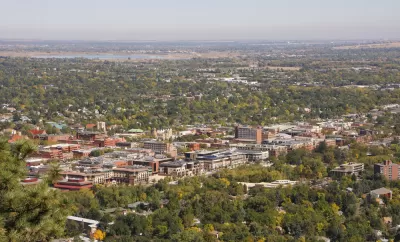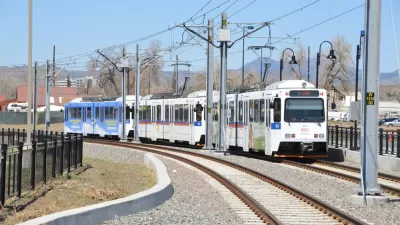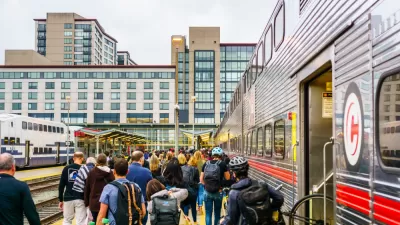County officials claim the region has not seen improved transit service despite the infusion of federal funding aimed at increasing service in small urbanized areas.

Colorado's Boulder County is asking the Regional Transportation District (RTD) for a binding contract to provide more transit service to the area, reports Nathaniel Minor. "The Boulder County commission sent RTD leaders a letter last week expressing frustration over the lack of service to the area despite the transit agency’s receipt of more than $700 million in federal stimulus money."
According to the letter, the county is "not seeing any results from that money" even as commuters return to work. "RTD executives said recently that they are offering about 70 percent of its pre-pandemic service levels but don’t have enough employees to restore more. They are also facing a long-term financial squeeze between a $300 million maintenance backlog, massive debt payments, and continued political pressure — from places like Boulder — to keep expanding its rail network."
The county is asking for "an inter-governmental agreement between local governments, RTD and the state Department of Transportation that would guide some of the federal bailout money to Boulder County transit service." Some of the funding would go toward "'high priority' RTD services like the Flatiron Flyer rapid bus line between Denver and Boulder" as well as "non-RTD transit services in smaller communities like Gunbarrel and Lafayette."
In a statement, Colorado Department of Transportation executive director Shoshana Lew said "it's 'especially critical' that small urbanized areas like Boulder quickly see the benefits of the federal money." However, "the state legislature and governor have also declined to give RTD any dedicated new revenue. RTD is an independent agency mostly funded through sales taxes and, to a lesser extent, fare revenue."
FULL STORY: Boulder County Pushes RTD For A Binding Agreement To Provide More Transit Service

Planetizen Federal Action Tracker
A weekly monitor of how Trump’s orders and actions are impacting planners and planning in America.

Maui's Vacation Rental Debate Turns Ugly
Verbal attacks, misinformation campaigns and fistfights plague a high-stakes debate to convert thousands of vacation rentals into long-term housing.

San Francisco Suspends Traffic Calming Amidst Record Deaths
Citing “a challenging fiscal landscape,” the city will cease the program on the heels of 42 traffic deaths, including 24 pedestrians.

Defunct Pittsburgh Power Plant to Become Residential Tower
A decommissioned steam heat plant will be redeveloped into almost 100 affordable housing units.

Trump Prompts Restructuring of Transportation Research Board in “Unprecedented Overreach”
The TRB has eliminated more than half of its committees including those focused on climate, equity, and cities.

Amtrak Rolls Out New Orleans to Alabama “Mardi Gras” Train
The new service will operate morning and evening departures between Mobile and New Orleans.
Urban Design for Planners 1: Software Tools
This six-course series explores essential urban design concepts using open source software and equips planners with the tools they need to participate fully in the urban design process.
Planning for Universal Design
Learn the tools for implementing Universal Design in planning regulations.
Heyer Gruel & Associates PA
JM Goldson LLC
Custer County Colorado
City of Camden Redevelopment Agency
City of Astoria
Transportation Research & Education Center (TREC) at Portland State University
Jefferson Parish Government
Camden Redevelopment Agency
City of Claremont





























